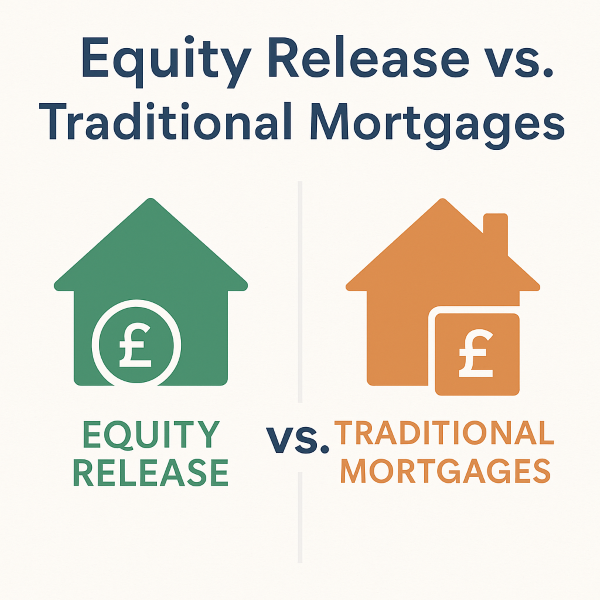What is equity release?
Equity release allows you to access the value tied up in your home and turn it into cash. This is done through specific policies that let you release equity (cash) from your property. It is available to homeowners aged 55 or older, even if your mortgage isn’t fully paid off.
 You can take the money as a lump sum, in smaller instalments over time (known as ‘drawdown’), or as a combination of both. In 2023, UK homeowners accessed over £2.5 billion of property wealth through equity release.
You can take the money as a lump sum, in smaller instalments over time (known as ‘drawdown’), or as a combination of both. In 2023, UK homeowners accessed over £2.5 billion of property wealth through equity release.
Approaching equity release carefully is crucial, as mistakes can make it very expensive. We’ll discuss the costs involved later.
The most common type of equity release is a lifetime mortgage, which is repaid when you pass away. This can be a suitable option if you don’t plan to leave your assets to anyone. However, if you wish to leave an inheritance, be aware that equity release may reduce the amount your beneficiaries receive. Ultimately, it’s your money, so prioritise your own financial needs and comfort.
What Can Equity Release Be Used For?
Equity release serves various purposes, including the following popular uses:
Home Improvements:
Upgrade your home with additions like a new kitchen or a spacious extension.
Clearing Debts:
Pay off outstanding mortgages or loans. However, the equity release debt may exceed the original amount cleared over time.
Property Purchase:
Invest in a second property or acquire a holiday home.
Retirement Income Boost:
Supplement your pension for a more comfortable retirement.
Holidays and Family Gifts:
Fund memorable trips or financially support loved ones.
The Types of Equity Release
Equity release products that help you access cash from your property fall into three main categories:
Lifetime Mortgages – For Those Aged 55 and Above
This is the most widely used type of equity release. You can borrow against your home’s value at a fixed or capped interest rate.
You can access the money as a single lump sum or withdraw smaller amounts as needed. The latter is called a drawdown arrangement. With drawdown, interest is only applied to the amount you’ve withdrawn, not to available funds.
If no repayments are made, the interest will compound over time, leading to a rising debt. However, many lifetime mortgages now allow voluntary repayments, which can include capital or interest payments. These repayments can help lower the total debt. Typically, there’s a yearly cap on overpayments, often set at 10% of the loan value.
Home Reversion Plans – For Those Aged 60+
Home reversion plans are less common than lifetime mortgages. They allow you to receive a tax-free lump sum by selling a portion of your home to a provider at below market value. You can remain in your property rent-free until you pass away. The proceeds are divided based on ownership percentages when the property is eventually sold. If your home’s value increases significantly, the provider’s share also grows.
For instance, selling a 40% share of a £450,000 property might provide you with a lump sum of £90,000. This amount is much lower than that share’s £180,000 market value. The discount reflects the provider’s long wait to recoup their money. If, years later, the property sells for £550,000, the provider’s 40% share would then be worth £220,000.
Home reversion plans may suit those expecting little property price growth. However, they could be less favourable if property values rise significantly.
Retirement Interest-Only Mortgages (RIOs): A Guide
Retirement interest-only mortgages (RIOs) are similar to lifetime mortgages but have one critical difference: you must make monthly payments. While RIOs aren’t technically a type of equity release, they allow you to access a lump sum of cash secured against your home’s value. If you have a stable monthly income, they can help you release equity from your property, even if you already have a mortgage.
RIOs are typically available to individuals aged 55 or older. Interest is charged on the amount you borrow, and unlike a lifetime mortgage where interest repayment is optional, RIOs require monthly interest payments. Overpayments are usually allowed, offering flexibility to reduce the loan balance faster.
Since interest is paid monthly, RIOs are cheaper than lifetime mortgages. Interest is only charged on the original loan amount, avoiding the compounding effect of unpaid lifetime mortgage interest. However, if you pay interest monthly on a lifetime mortgage, its cost can align with a RIO.
RIO
To qualify for a RIO, you must pass affordability checks to prove you can meet the monthly payments. RIOs can replace standard interest-only mortgages or provide an option for accessing equity in later life. Borrowing limits depend on your age, property type, and the specific RIO product. Loan-to-value (LTV) ratios are usually capped at around 60%, similar to lifetime mortgages.
While some RIOs allow you to port the mortgage to another property, they typically lack downsizing protection. This means you could face early repayment charges if the lender doesn’t accept the property you wish to move to.
What Are My Options if I’m Under 55?
Equity release is only available to individuals aged 55 or older. If you’re nearing this age, you may choose to wait.
However, if you’re a homeowner under 55 and need financial support sooner, there are other options. Speaking to a mortgage broker could help you explore remortgaging. For more complex situations, consulting a financial adviser may be beneficial.
Options
Remortgaging can reduce your monthly mortgage payments and may allow you to access additional funds using your property as security. Many UK lenders have raised their maximum age limits for mortgage applicants. You might still qualify for a mortgage if you’re an older homeowner uninterested in equity release.
Thank you for reading our article, “Is Equity Release Right for You? | Connect Lifetime Explains. Stay “Connect“-ed for more updates soon!






